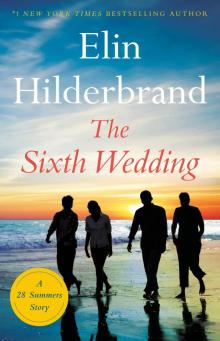- Home
- Elin Hilderbrand
Winter Solstice Page 2
Winter Solstice Read online
Page 2
Eddie holds up a hand. “Stop,” he says. “The thing with Brick is ancient history.”
“Two and a half years is ancient history?” Grace says. “Well, I’m sure you’d like to think so.”
Eddie bows his head; he feels a quarrel coming on. Grace was sweet and steadfast while Eddie was in prison. She sent him carefully curated care packages, and she wrote long, newsy letters. She came to visit every week without fail, often with whichever daughter she could wrangle into joining her. But now that Eddie is back at home, Grace’s anger, disappointment, and skepticism float to the surface more often than he would like.
“Brick survived, didn’t he?” Eddie says. He knows that Brick Llewellyn, Allegra’s former beau and the son of Grace and Eddie’s former best friends, Madeline and Trevor, was accepted at Dartmouth, and then he won the Nantucket Golf Club scholarship, which pays his tuition, room, and board for four years. Eddie heard this from Grace, who still talks to Madeline, although their friendship is nothing like it used to be. They used to be closer than sisters. Eddie hasn’t seen or spoken to either of the Llewellyns since being released. If Eddie thought they would resume their weekly family dinners, he was apparently mistaken. The Llewellyns, most likely, want nothing to do with Eddie Pancik, making the fact of the Quinn invitation that much more important.
“I’ll see if Allegra wants to go to the party,” Eddie says.
Grace gives him a tight-lipped smile, swallowing whatever else she wanted to say with the bright, grassy sauvignon blanc. “You can ask her now. She’s in her room.”
Eddie knocks on the door of the little bedroom, which is no bigger than Allegra’s walk-in closet in their old house. “Allegra?” he says. “It’s Dad.” He nearly says, It’s Eddie, because Eddie is what Allegra calls him at the office, and whereas at first, being addressed that way by his child felt like a bucket of cold salt water to the face, now he has grown used to it.
There’s a murmur from the other side of the door that sounds welcoming, but maybe that’s too optimistic a word. At home Allegra still displays flashes of her former self. She can be pouty, bitter, self-absorbed. Eddie eases open the door. Allegra is lying on the bed in shorts and a Nantucket Whalers T-shirt with her laptop open on her chest. She barely looks up when Eddie enters, and he wonders what she’s so absorbed with. It’s probably Facebook, right, or she’s bingeing on one of those Internet series that have no boundaries. Troy Steele, a fellow inmate at MCI–Plymouth, made Eddie watch an episode of something called The Girlfriend Experience, and it was no better than porn. Eddie wishes that Allegra were on Zillow, memorizing the square footage and floor plans of every property for sale on Nantucket. That’s how you get ahead!
“Hi there,” Eddie says. Allegra’s hair is messy and she’s not wearing any makeup. Her eyes are swollen like maybe she’s been crying. But she is still beautiful. “In case you’re wondering, I think Hunter Bloch is an idiot.”
Allegra grants Eddie a patient smile. “That he is,” she says.
“I’d like you to do me a favor,” Eddie says, and he tosses the invitation onto Allegra’s bed. “Go to this party with me?”
Allegra reads the invitation. “Bart Quinn?” she says. “He’s hot. I always thought he was hot, but now that he’s, like, a war hero, he’s really hot.”
“Hot?” Eddie says, and his spirit flags. Why does Allegra have to be so boy crazy? Why can’t she be more like Hope and be obsessed with Emily Dickinson? Why can’t she be more like Hope and act like Emily Dickinson—locked in her garret room, writing poetry by the light of one flickering candle?
“It’s on Halloween,” Allegra says. She hands the invitation back to Eddie. “Okay, I’ll go.”
“You will?” Eddie says. For some reason this answer catches him off guard. He expected a struggle.
Allegra shrugs. “Sure. I was supposed to go to the Chicken Box with Hunter. He was going to sneak me in the back door.”
“Oh,” Eddie says. He’s suddenly relieved Allegra and Hunter broke up. The last thing he wants is for people to see his underage daughter dancing in the front row at the Chicken Box, waving her beer around, making out with Hunter Bloch, or displaying any other inelegant behavior. “Well, this will be much more fun.”
“Doubtful,” Allegra says. “But it’s something to do. Is it a costume party?”
“I assume so?” Eddie says. He searches the invitation for dress code. It says nothing except that it’s a birthday party for Bart Quinn at the VFW at 7:00 p.m. on Halloween. Halloween is a Tuesday night, not a usual night for a party, so it must be a Halloween party, which means costumes. Eddie’s wheels start turning.
“I don’t know about you,” Eddie says, “but I’m dressing up.”
“I have a Japanese geisha costume,” Allegra says. “I’ll wear that.”
Japanese geisha? Eddie thinks. He supposes it could be worse; at least she’ll be fully dressed. “That’s my girl,” he says.
AVA
She’s still struck by the novelty of it: pushing through the turnstiles of the subway and trudging up the stairs, just one of ten million people. She stops by the dry cleaner on the corner of Lexington and Eighty-Second Street and picks up her laundry from Nina Hwang. It’s clean, folded, and bagged for fifteen bucks, an urban miracle as far as Ava is concerned. She ducks into the deli next door and gets a bunch of red Gerber daisies, as it’s Friday and Ava has made a practice of purchasing fresh flowers every Friday, which is the night Potter comes all the way over from the West Side for dinner at Ava’s apartment.
As Ava approaches her building, she fumbles for her keys. Keys, she’s still not used to keys. In her life on Nantucket she had only one key, the key to her Jeep, which she always kept on the passenger seat. She never had a key to the inn. It was an inn and therefore always open. Even when it was closed—January, February—it was unlocked. Does a key even exist? If so, Ava has never seen it.
Now her ring jangles with a key to the front door of her building on Eighty-Second Street; two keys to her apartment—doorknob and dead bolt; a key to her mailbox; and three keys to Potter’s apartment, which he insisted she take at the end of August when she moved, permanently, to Manhattan. Potter had wanted Ava to move in with him on the Upper West Side from the get-go, and Ava’s mother, Margaret, had wanted Ava to either move in with her and Drake on Central Park West or take over Drake’s apartment in the West Village. All these offers were tempting, but Ava, at the age of thirty-two, had never lived alone. She had spent her entire adult life living with her father, Mitzi, her brothers, and sixteen rooms filled with virtual strangers. How had she even considered marrying Nathaniel or Scott? She would have missed out on this seminal experience: a place all her own.
Ava’s one-bedroom apartment is a fifth-floor walk-up, meaning four flights of stairs, but nothing about the climb—even carrying her heavy school bag and a load of laundry—diminishes the joy Ava feels each and every time she walks into her apartment. It is, absolutely, nothing special. The kitchen is the size of a piece of pie, a four-square-foot triangle that features a fridge with a microwave above it on one side and a small stove on the other, a sink in the middle, and enough countertop to either drain dishes or place a cutting board, but not both at the same time. The bathroom floor is made up of tiny hexagonal tiles in black and white, but whole rows of them are missing against the walls. There is exposed brick in the living room, Ava’s sole point of pride, as she knows exposed brick to be valued in Manhattan real estate, although she’s not sure why, since she can’t hang anything on it. The bedroom has two windows, both with bars, and a reasonable closet. Granted, Potter’s apartment has cathedral ceilings and a butler’s pantry off the kitchen and one and a half baths and original crown molding. Both Margaret’s and Drake’s apartments fall into the luxury category. Margaret’s apartment is a three-bedroom overlooking Central Park—meaning that if you tossed a water balloon, that’s where it would land—and Drake’s apartment, though smaller, is sleek and modern and filled wit
h actual art that he buys from a dealer in Chelsea. Both Odell Beckham Jr. and Jimmy Fallon live in Drake’s building, and there’s a pool on the roof and a fondue restaurant on the first floor that is presently the hottest reservation in the city.
But what Ava treasures about her apartment is that everything in it is hers. Her books are lined up on the shelves, her music plays on the wireless speakers—she can play Natalie Merchant whenever she wants, and no one is around to complain—her favorite foods are in the fridge, her twelve pillows dominate the head of the bed. She bought a Persian rug for the living room at the flea market on Columbus Avenue, and she has hung photographs of Nantucket on every available bit of wall space. Set up in the corner is a stepladder that she has decorated with white fairy lights and houseplants. It’s not sophisticated, but Ava doesn’t care. She loves it because it’s hers.
Ava puts the Gerber daisies in her white scallop shell vase and places it in the center of her round white dining table from IKEA (the table is an eyesore; Ava will replace it after she saves up), and she pours herself a glass of white wine. Potter is due at seven. Ava is making tomato soup from scratch, grilled ham and cheese sandwiches, and a green salad with creamy lime dressing. Her past Friday-night endeavors have included roast chicken, pork chops braised in milk, and a gluey mushroom pasta that they decided to throw away after the first bite in favor of pizza from Ray’s. Ava takes both her successes and her failures in stride. She isn’t cooking to please Potter as much as she is cooking to please herself.
She realizes she may seem solipsistic, but she doesn’t care. She is reveling in being her own person.
She needs to go to Gristedes and get started on the soup and the dressing, but an envelope among the pile of mail—a purple envelope?—catches her eye. She recognizes Mitzi’s handwriting on the front, and suddenly the purple makes sense. Why settle for a white envelope when you can send purple? That would be Mitzi’s logic.
Ava opens the envelope. It’s an invitation to Bart’s twenty-second birthday party on Halloween at the VFW on Nantucket. Well, Ava thinks, if anyone deserves a party, it’s Bart. He missed his twenty-first birthday. There were no kegs, no streamers or cake, in the prison camp on the barren plains of southern central Afghanistan.
Halloween is a Tuesday this year. There’s no way Ava can attend the party, and that’s the God’s honest truth; she won’t feel guilty because her circumstances flow with her personal preference. She doesn’t want to go. It’s not only that she detests Halloween—every teacher in America hates Halloween, with all the kids hyped up the day of and in a sugar coma the day after—it’s also that Ava doesn’t want to go home. She’s afraid that if she sees that her father is sicker than anyone is letting on, and that Bart is clinically depressed, and that Kevin and Isabelle are underwater from the birth of their second baby in two years, and that Mitzi is incapable of holding everyone together—instead of dealing with the real issues, here she is, throwing a party at the VFW—Ava will feel like she has to move back.
Move back! Impossible. She has her apartment; she has a job she adores. Copper Hill is the best place to teach music in the whole country. First of all, music is an elective, so every single one of Ava’s seventy-five students—five classes of fifteen—wants to be there. Not only do they want to be there, they want to achieve. Ava has singers and piano players and composers and musical history students. And she runs the madrigal group and a club for recording music videos.
Also, Ava has a boyfriend whom she is healthily in love with. There’s no drama with Potter, no theatrics, no jealousy (not much jealousy), no tears, no senseless yearning, no insecurities (or not much insecurity, anyway).
Ava is not going home, even for a party, even for Bart. She doesn’t want to feel guilty.
Halloween is rapidly followed by Thanksgiving, and Thanksgiving is rapidly followed by Christmas. She’ll go home for Thanksgiving and Christmas… well, actually, Potter said something about taking a trip to Austria over Christmas—Salzburg and Vienna. Ava nearly shrieked with joy. To visit the birthplace and breeding ground of so many great composers—Mozart, Schubert, Haydn, Mahler, Strauss. She is thirty-two years old and has never been to Europe!
But… she has to wait and see how her father is doing.
Her cell phone rings. It’s Potter.
“Hey, baby,” Ava says.
“Ava,” Potter says. The tone of his voice makes Ava think that something awful has happened. Maybe Gibby, Potter’s grandfather, has died. Oh, Gibby!
“What’s wrong?” Ava says.
“I have to cancel on dinner tonight,” Potter says. “Trish just called. At the last minute she and Harrison decided to fly in from San Fran to attend the Shakespeare symposium at Bard College, so she asked if I could take PJ for the weekend. Of course I said yes.”
“Of course you said yes!” Ava says. “This is good news, right? I mean, a bit unexpected and last minute, but still good. I finally get to meet him! Please, bring PJ here for dinner. I was planning on making grilled cheese anyway. Or we can go out. We can go to Serendipity and get foot-long hot dogs and frozen hot chocolates. And then tomorrow we can go to the Museum of Natural History! He’s the perfect age for the planetarium, and I think they’re having an exhibit on arachnids.”
Potter laughs. “You’re much more enthusiastic about this than I thought you’d be. You’re much more enthusiastic about this than I am.”
“You always say you wish you had more time with PJ,” Ava says. “You always say you wish he lived closer.”
“You’re right, you’re right,” Potter says.
“So do you want to bring him here, or shall we go out?” Ava asks.
“I’ll bring him there, I guess,” Potter says.
“Or do you want a night with him alone?” Ava asks. “I’m so sorry… I didn’t mean to assume…”
“No, no,” Potter says. “If I were going to keep him to myself, it would be to avoid inflicting ourselves on you. I’ve told you, PJ can be kind of difficult. He suffers from only-child-raised-by-bicoastal-academics syndrome.”
“I’ve been teaching for nine years,” Ava says. “I’ve seen my share of difficult children. Maybe not that exact syndrome, but believe me, I can handle it. How many times have I told you about Micah?”
“The two of us will be over at seven,” Potter says. “I think we should stay in. Serendipity is noisy and there’s always a wait and he’ll be tired from traveling.”
“Okay, then,” Ava says. “I’ll set the table for three.”
Ava changes into jeans and a crisp white blouse and grabs her bag to go to the store. Her phone pings: it’s a text from Margaret. Drake got a reservation at Le Coucou tomorrow night at nine. Can you and Potter join us?
Ava’s heart sinks just a little. One of the best things about moving to New York has been spending time with her mother. For the twenty-plus years that Ava was growing up on Nantucket with Kelley and Mitzi and her brothers, Margaret often seemed far away, out of reach, and sometimes less than real. Ava most often saw her mother on TV—reporting from Baghdad or Paris or from the CBS studios in New York. Now that they live in the same place, they love doing things together—shopping, movies, museums, and double dates. Margaret is Ava’s best friend in the city; Drake and Margaret are Ava and Potter’s best couple friends. Last week the four of them had brunch at Le Bilboquet, then took a long walk through Central Park. All four of them have been dying to eat at Le Coucou, but a reservation has eluded them until now.
We can’t, Ava texts back. Potter’s son, PJ, is here for the weekend.
No problem! Margaret responds. We’ll do it another time.
Then the phone rings and it’s Margaret.
“Hi?” Ava says.
“Hi, sweetie,” Margaret says. “I just called real quick to see how you’re feeling about meeting PJ?”
“I feel excited,” Ava says.
“Really?” Margaret says.
“Yes, really,” Ava says, and a tinge of impatience cr
eeps into her voice. She knows that Margaret’s only “concern” about Potter is that he has a child with someone else, an emotional landscape that Ava is unfamiliar with. Ava pointed out that she has plenty of friends who have children—Shelby and Zack have Xavier, for example—and Ava now has a niece and four nephews. Margaret then suggested that this would be different. More challenging. Ava should be prepared to be patient and make concessions where PJ was concerned. And when she finally met PJ, she should “tread lightly.” Those were Margaret’s exact words. “I’m excited to meet him. It’s been a year since we started dating.”
“I know,” Margaret says. “You may think you know Potter inside and out, but just remember, you’ve never seen him be a parent. You may be surprised.”
Surprised? Ava thinks. Her mother rarely annoys her, but Margaret is coming dangerously close to doing so now. But before Ava can tactfully inform Margaret that she is perfectly capable of handling herself with PJ and with Potter in the role of father, Margaret says, “Oh, honey, I have to go to wardrobe. Roger is making ugly faces at me from down the hall. Love you, sweetie. We’ll miss you tomorrow night. Bye-bye.”
“Uh… bye,” Ava says. She hangs up and heads down the stairs. The phone call was meant to be supportive, she knows, but it leaves her feeling worse. Mostly because Margaret is nearly always right.
Ava has everything ready to go when Potter rings the buzzer: the soup is simmering on the stove, the grilled cheeses are composed, the salad greens are washed and topped with perfectly ripe slices of avocado. (From experience Ava has learned your chances of choosing a perfectly ripe avocado are approximately one in a hundred.) She and Potter don’t usually eat dessert, but because PJ is coming, Ava bought whoopie pies at the market, as well as some frightfully expensive organic ice pops. She’s playing Wilco—Potter’s favorite band—and the table is set for three, with glasses of ice water at two places and a glass of milk at the third.

 What Happens in Paradise
What Happens in Paradise Reunion Beach
Reunion Beach The Sixth Wedding
The Sixth Wedding 28 Summers
28 Summers Summer of '79: A Summer of '69 Story
Summer of '79: A Summer of '69 Story Troubles in Paradise
Troubles in Paradise The Perfect Couple
The Perfect Couple Winter Solstice
Winter Solstice Barefoot: A Novel
Barefoot: A Novel